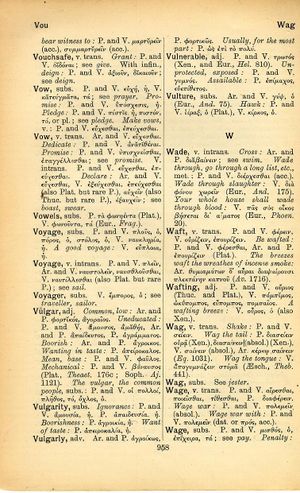wag: Difference between revisions
From LSJ
τὸ δ' ἐξαίφνης τὸ ἐν ἀναισθήτῳ χρόνῳ διὰ μικρότητα ἐκστάν → suddenly refers to what has departed from its former condition in a time imperceptible because of its smallness
m (Text replacement - "<b class="b2">Eq.</b>" to "''Eq.''") |
m (Woodhouse1 replacement) |
||
| Line 1: | Line 1: | ||
{{Woodhouse1 | {{Woodhouse1 | ||
|Text=[[File:woodhouse_958.jpg|thumb|link={{filepath:woodhouse_958.jpg}}]] | |Text=[[File:woodhouse_958.jpg|thumb|link={{filepath:woodhouse_958.jpg}}]] | ||
===verb transitive=== | |||
[[shake]]: [[prose|P.]] and [[verse|V.]] [[σείειν]]. | |||
[[wag the tail]]: [[prose|P.]] [[διασείειν οὐρᾷ]] ([[Xenophon|Xen.]]), [[διασαίνειν]] (absol.) ([[Xenophon|Xen.]]). [[verse|V.]] [[σαίνειν]] (absol.), [[Aristophanes|Ar.]] [[κέρκῳ σαίνειν]] (''[[Equites]]'' 1031). | |||
[[wag the tongue]]: [[verse|V.]] [[ἀπογυμνάζειν στόμα]] ([[Aeschylus|Aesch.]], ''[[Seven Against Thebes]]'' 441). | |||
===substantive=== | |||
See [[jester]]. | See [[jester]]. | ||
}} | }} | ||
Revision as of 08:53, 20 May 2020
English > Greek (Woodhouse)
verb transitive
wag the tail: P. διασείειν οὐρᾷ (Xen.), διασαίνειν (absol.) (Xen.). V. σαίνειν (absol.), Ar. κέρκῳ σαίνειν (Equites 1031).
wag the tongue: V. ἀπογυμνάζειν στόμα (Aesch., Seven Against Thebes 441).
substantive
See jester.

